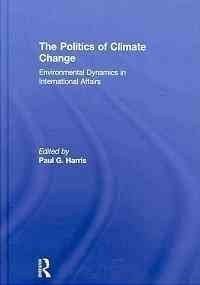

具体描述
Climate change is now a mainstream part of the international political agenda. It has become clear that it is not solely a technical issue, to be resolved by scientists, but a political issue with political implications at all levels of global governance. Indeed, some may argue that few long-term problems in international affairs are more important than this one. The purpose of this book is to reveal and apply some of the latest thinking on the implications of climate change for international affairs, and to explore how various proposals for tackling climate change will affect interstate relations in coming years. Chapters by scholars of international relations, international political economy and international law contribute to current discussions of climate change, doing so in way that is accessible to students, stakeholders, government officials and informed laypersons. Some questions considered in the book include the following: How has the discussion of climate change affected interstate relations? How does this problem, and how do environmental issues more generally, challenge international relations theory? How do international climate politics influence domestic politics, and vice-versa? How would climate change or action taken to tackle it affect the balance of power or balance of influence? Is climate change a matter of international security or international justice-or both-and how does the answer to this question affect policy responses of governments? Which states are likely to benefit or suffer from the various proposals to address climate change? What are the legal, ethical and political implications of the uneven distribution of the impacts of climate change? This book was previously published as a special issue of the Cambridge Review of International Affairs.
作者简介
目录信息
读后感
评分
评分
评分
评分
用户评价
这本书的书名在很大程度上就勾勒出了其核心议题,它无疑是为那些对环境政策制定过程抱有深切兴趣的读者量身定做的。我一拿到手,就被其严谨的学术框架和对全球气候治理复杂性的深入剖析所吸引。作者似乎并没有满足于停留在对科学共识的简单罗列上,而是着力于揭示在各国政府、国际组织乃至非国家行为体之间,利益冲突是如何扭曲或推动气候行动的。书中对不同政治体制下气候政策的比较分析尤为精彩,它巧妙地穿插了多个历史案例,比如早期京都议定书的艰难谈判,以及近年来《巴黎协定》所展现出的那种“自下而上”的聚合效应。阅读过程中,我深刻体会到,气候变化远不止是一个技术或科学问题,它本质上是一个权力、分配和认同的政治博弈场。作者展现出的细腻洞察力,使得即便是对国际关系理论不甚熟悉的读者,也能清晰地理解气候治理背后的权力动态和意识形态较量。尤其值得称赞的是,它并没有提供一个简单的解决方案,而是清晰地指出了现有治理结构的内在张力,促使我们思考,在当前碎片化的全球政治图景下,我们究竟如何才能达成真正有约束力的、公平的集体行动。这种对现实政治的清醒认知,让这本书在众多泛泛而谈的气候读物中脱颖而出,成为了一部不可多得的政治学力作。
评分这本书的论证结构非常清晰,像一个精密的瑞士钟表,每一个齿轮——无论是历史背景、理论框架还是实证分析——都咬合得天衣无缝。我特别欣赏作者在方法论上的审慎态度。他们似乎避免了那种“一刀切”的简单归因,而是倾向于使用多重因果模型来解释气候政策的复杂性。例如,在分析气候变化对地缘政治的影响时,书中并没有简单地将气候视为冲突的唯一驱动力,而是将其置于既有的安全困境、资源竞争以及民族主义复兴的大背景下进行考察。这种平衡的视角,让这本书避免了陷入那种过于乐观或过于悲观的泥潭。它坦诚地展示了气候行动中的“机会窗口”是多么狭窄和转瞬即逝,以及那些看似无关的国内政治事件(比如一次大选结果或一次重大的经济衰退)如何能瞬间重塑国际气候议程。阅读过程中,我时常需要停下来,细细品味其中几段对权力关系描述的精妙措辞,它们往往一语中的地概括了某个政治僵局的核心症结。对于那些期望在气候领域进行政策研究或外交分析的人来说,这本书无疑提供了一个坚实的理论基石。
评分与其说这是一本关于气候的书,不如说它是一本关于人类集体行动困境的深刻反思。作者的笔触犀利而富有洞察力,他们将气候问题置于更宏大的政治哲学语境中进行审视。书中对“主权”概念在气候治理中的挑战尤其引人注目,在一个需要全球协作的议题上,民族国家的固执与狭隘利益如何成为最大的绊脚石,被描绘得淋漓尽致。我发现自己不断地在思考书中提出的那些尖锐问题:在全球尺度上,我们是否真的能够超越亚里士多德式的城邦政治思维?当短期经济利益与长远生存危机发生冲突时,政治家的决策逻辑究竟是什么?书中引用的若干政治理论家的观点,与当代气候谈判的实际操作形成了有趣的对话,这种跨学科的融合使得阅读体验极为丰富。它迫使读者从一个全新的角度去审视我们所处的政治现实——一个充满不信任、信息不对称和短视决策的系统。因此,这本书不仅是对气候政策的描述,更是一次对现代政治有效性的严肃拷问。
评分这本书的文字风格和论述的节奏感,给我留下了极其深刻的印象,它有一种沉静而有力的美感。作者似乎拥有将晦涩的制度分析转化为引人入胜叙事的能力,他们对关键人物和关键时刻的捕捉精准而富有戏剧张力。我特别喜欢他们对气候“正义”议题的处理方式,它超越了简单的财富再分配讨论,深入到对“未来世代权利”和“生存空间”的形而上学辩护中。在阅读过程中,我仿佛置身于那些闭门会议之中,亲耳聆听各国代表们关于减排义务的唇枪舌战。这本书的价值在于,它去魅化了气候政治的神圣光环,将其还原为充满妥协、权衡和人性弱点的日常政治活动。它毫不留情地揭示了,那些看似进步的气候倡议,往往是建立在一系列复杂的国内政治交易和国际权力平衡之上的脆弱共识。对于那些希望深入理解气候变化如何成为当代国际政治主旋律的读者来说,这本书提供了一个既有学术深度又具备极高可读性的导航图,它展示了政治机器是如何缓慢地、不情愿地,但仍在某种程度上,回应着人类共同面临的生存挑战。
评分当我合上这本书的最后一页时,我感到的是一种智识上的饱足,而非简单的信息灌输。这本书的叙事节奏掌控得极佳,它不是那种堆砌数据的教科书,而更像是一部精心编排的政治史诗,探讨了“谁来决定未来”这一宏大命题。作者叙述的深度和广度令人印象深刻,他们似乎探访了每一个可能影响气候决策的角落,从华盛顿的游说团体到布鲁塞尔的官僚机构,再到发展中国家内部关于能源转型的激烈辩论。特别是书中对“责任分摊”这一核心议题的探讨,简直是刀刀见血。它没有回避那些令人不适的真相:历史排放大国的道德义务与当前新兴经济体发展权的冲突,是如何在国际谈判桌上被不断地模糊和推诿的。书中使用的案例研究,比如对某个特定国家碳税政策推行的政治阻力分析,细致到令人惊叹,每一个转折点都充满了戏剧性和现实的无奈。这种基于扎实田野调查和档案挖掘的写作风格,赋予了文本极强的可信度和穿透力。对于想要理解气候行动为何如此缓慢、充满阻碍的读者来说,这本书提供了一张详尽的“政治解剖图”,揭示了阻力并非来自外界,而是内嵌于我们现有的政治经济体系之中。
评分 评分 评分 评分 评分相关图书
本站所有内容均为互联网搜索引擎提供的公开搜索信息,本站不存储任何数据与内容,任何内容与数据均与本站无关,如有需要请联系相关搜索引擎包括但不限于百度,google,bing,sogou 等
© 2026 book.wenda123.org All Rights Reserved. 图书目录大全 版权所有




















